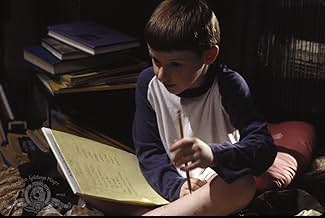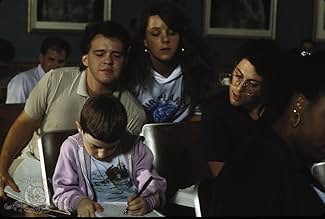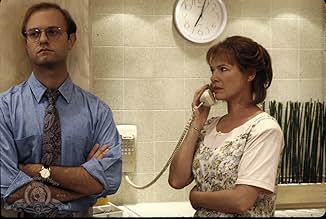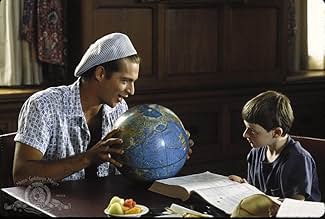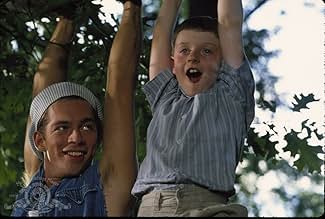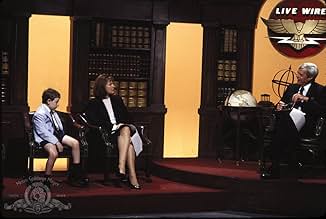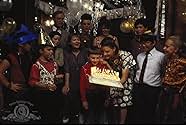Une mère célibataire élève seule un enfant prodige, elle s'efforce de lui donner les meilleures opportunités, susceptibles de lui permettre d'exprimer son don.Une mère célibataire élève seule un enfant prodige, elle s'efforce de lui donner les meilleures opportunités, susceptibles de lui permettre d'exprimer son don.Une mère célibataire élève seule un enfant prodige, elle s'efforce de lui donner les meilleures opportunités, susceptibles de lui permettre d'exprimer son don.
- Prix
- 2 victoires et 1 nomination au total
- Garth
- (as David Pierce)
Avis en vedette
Fred is a young boy who is extremely gifted, his intelligence is something very special. But his mom, DeeDee, doesn't really let him expand since she is a single mom wanting her son just to be normal. But Fred is discovered by Jane Grierson, a professor of highly intelligent and gifted children, giving Fred the chance to expand his world and even takes him to college at a young age. Fred meets interesting characters throughout his journey learning that maybe life has more to offer than what he used too.
Little Man Tate is a very good movie and very charming. I know some might find it a little boring, but honestly, you have got to give this movie a chance, it has great drama and some fun comedy along the way. David Hyde Pierce was such a fun addition to the cast, he really makes his screen presence enjoyable, so does Dianne. But the whole cast is just perfect and seemed to enjoy doing this movie together. I would highly recommend this movie, it's a good one to watch.
7/10
To be fair, the movie looks little more than a better-than-average TV movie, but is elevated by its director's star turn in front of the cameras, plus some neat little (that word again!) directorial flourishes, like a slow cutaway into the distance of Foster's workaday waitress Dee Tate's mother/son dance with young son Fred and at other points interesting suffusions of light and animation to perhaps demonstrate the surging thought process of the precocious infant.
The narrative gets a little skewered as Fred is adopted by a wealthy philanthropist female, childless naturally, whose feelings quickly move from professorial to matrimonial and a too obvious conflict with Foster's more down-home mother love. Some of the situations are a little too pat also, for instance the way that Fred cleaves to older boys, one a maths prodigy himself, the other a piano-playing college boy (played by a young Harry Connick Junior), the lad obviously groping emotionally for a male bonding relationship with his natural father nowhere around.
Freak occurrences too like Connick's initial encounter with Fred (symbolically dropping the whole world on his shoulders!) and a side-lined Foster's rescue of a drowning child just as Fred's making an appearance at the professor's side on national TV also jar credulity a little and of course sentimentality rears its largely unwelcome head before the happy ending, but I'm perhaps being too severe on what is when all is said and done, a warm, family entertainment on an off-beat subject.
One grouse though...as far Diane Wiest's character is concerned. I think her role is too much of an extreme as compared to Jodie Foster's. At the end of the film, Wiest's character, Jane Grierson ends up looking sheepish, repenting and even stupid to an extent. The end is almost sort of an ode to perfect motherhood, decrying the failure of the poor mentor spending tons of money by taking prodigies under her wing. It seems to say, child prodigies don't need all that specialized atmosphere, don't need special benefits, when in fact they do. I'm not saying that they ought to be living in state-of-the-art cages where they will only interact with other prodigies. But they do need a lot of other benefits that ordinary schools which underestimate the intelligence of even "normal" people just cannot provide. Child geniuses need to be dealt with very sensitively, keeping in mind their advanced faculties all the time and an atmosphere has to be created for them to properly nurture their special gifts. Somehow this film, by showing Jane Grierson as obviously insensitive, indirectly puts forth a bad case for special training for child geniuses. The real test of motherhood and Dede's feelings of jealousy towards Jane would have been explored if Jane, along with her maternal feelings for Fred would have also been shown to be sensitive or considerate. Instead we are made to laugh at Jane because she offers Fred some brown fruit/veggie juice and he asks for Coke... So that's it. This film is good, not for the content or it's resolution, but for the acting. Kudos to Adam Hann-Byrd!
The story is of Fred Tate, son of single mother Dede. It's found that, at the age of 2, Fred can already read the print on the bottom of a dinner plate. Dede, and the rest of the world, realize that Fred is a genius, but Dede is determined that Fred, while given ever opportunity to expand his gift, is not exploited by the well meaning, but pretentious head mistress of a school for gifted children, Jane Grierson, portrayed by the outstanding actress Dianne Wiest.
The story's told, mainly, through the eyes of Fred; however, we also see the viewpoints of Dede & Jane who each feel that she alone has Fred's best interests at heart. We are given tremendous insight into how Fred sees and relates to the world around him. He has the understanding that's beyond most adults but only the emotional experience of his 7 years of life.
Through Fred, we can see that the academic world of gifted children isn't just filled with the nice, polite, precocious, bespectacled children that we are often shown on news magazines or public television programs. We are allowed to see that some are as outright rude and pretentious as the adults who claim to be only nurturing their gifts.
In her feature-film directorial debut, Foster is able to capture the world as Fred sees it. She's able still allow us to see Fred as the youngster he is. Fred's intellect isn't the basis of the story, just one element in it. She lets the story do the work, and she let's the character's tell the tale. She allows the characters to be real people not just the stereotypes that so often are found in films dealing with this subject matter.
Jodie Foster's only directed two films since this one ("Home For The Holidays"-1995 & "Flora Plum"-2005), and I've seen "Home For The Holidays" which I also feel was very well done. It seems that Ms. Foster is being very careful in picking her projects, much like the late Stanley Kubrick did. I only hope her unique talents are recognized and she's given more green lights for future projects.
She brings out the subtleties of her character. Fred seems adult-like in a child's world and yet deals with child-like simplicity in an adult's world. Jane is the headmistress of a school for the gifted, who believes that her theories on child-prodigies can bring out Fred's best talents, but forgets that Fred's best is not in his head but in his heart. Working to give her child the best yet fierce-fully protective of Fred is his mother Dede. This movie perfectly capture the heartbreaking events that can happen when a child is given too much attention but no affection. Hats off to Adam Byrd who gives a very nuanced performance. Both Jodie Foster and Nancy show the little personality clashes very well. Jodie foster has done a great job when she shows Dede's reaction and then later Jane's reaction to the fact that Fred has had a nightmare.I hope to be able to see more movies from her.
Le saviez-vous
- AnecdotesJodie Foster asked David Hyde Pierce to appear in the film after remembering him from college. They both attended Yale University.
- GaffesThere are several errors in simple mathematics in the movie: Firstly, Damon "The Mathemagician" Wells correctly states that there are 25 228 800 minutes in 48 years (but 25,246,080 minutes if one counts the 12 leap-days that would occur in any span of 48 years that doesn't include a century year - only century years evenly divisible by 400, like 2000 but not 1900, are leap years), then says that this is 151 368 000 seconds. This is clearly wrong as 25 228 800 x 60 is 1 513 728 000 (more than 10 times as much). Furthermore, Fred says that the cube root of 3 796 466 is 156 although 156*156*156 is 3 796 416.
- Citations
[last lines]
Fred Tate: I once got this fortune cookie that said, "only when all things around you are different will you truly belong". Well, we're all different that's for sure. I see Jane everyday at the institute, and once in while Dede let's her take us out to a fancy restaurant. Sometimes we even have fun. After a while I was the most famous kid at Jane's school. But then a year later, a 6 year old boy named Willie Yamaguchi got into law school, and suddenly I wasn't such a big deal anymore. But I don't care, because I was happy.
- Bandes originalesI Get A Kick Out Of You
Words and music by Cole Porter
Performed by Ella Fitzgerald
Courtesy of Polygram Special Products
A Division of Polygram Group Distribution, Inc.
Meilleurs choix
- How long is Little Man Tate?Propulsé par Alexa
Détails
- Date de sortie
- Pays d’origine
- Langues
- Aussi connu sous le nom de
- Little Man Tate
- Lieux de tournage
- Upham Hall Miami University, Oxford, Ohio, États-Unis(The scene where Fred gets hit in the head with the globe was shot in front of Upham Hall)
- société de production
- Consultez plus de crédits d'entreprise sur IMDbPro
Box-office
- Budget
- 10 000 000 $ US (estimation)
- Brut – États-Unis et Canada
- 25 010 896 $ US
- Fin de semaine d'ouverture – États-Unis et Canada
- 230 106 $ US
- 14 oct. 1991
- Brut – à l'échelle mondiale
- 25 010 896 $ US
- Durée
- 1h 39m(99 min)
- Couleur
- Mixage
- Rapport de forme
- 1.85 : 1


